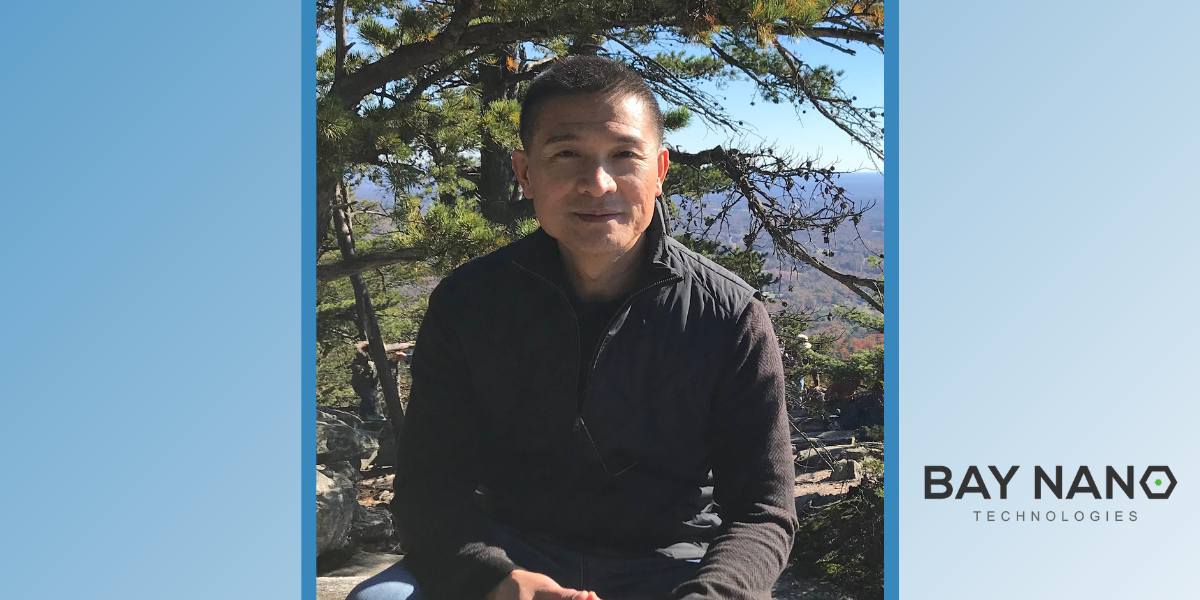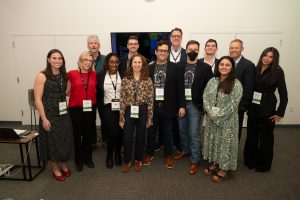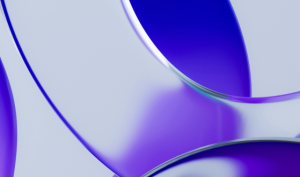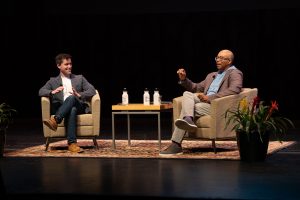CED recently spoke with Charles Tse a Raleigh-based entrepreneur to learn more about how Bay Nano and their smart glass technology will help combat rising energy costs while improving energy efficiency. CED, the startup ecosystem, and Charles have had a successful history together while he previously founded three companies – two with exits. Read on to learn more about his exciting current venture.
What does Bay Nano do?
Bay Nano makes energy-saving low-cost smart glass and smart EC plastic laminates for applications such as windows, curtain wall/architectural glass, automotive glass, and roof-coverings. When the smart glass starts to tint, it blocks all the UV light, NIR (heat), and glare while allowing you to stay connected with the outside environment. You can control the degree of darkness via a smartphone, or it can be automated.
What problem does Bay Nano solve?
Climate change is an existential threat to humanity due to man-made greenhouse gas emissions. Buildings account for 39.2% of energy use that leads to 13 gigatons of CO2 emissions per year (out of the total of 33 gigatons). Lighting and HVAC directly contribute over 5 gigatons of CO2. It has been shown by the Department of Energy (DOE) that, using smart glass can save building’s energy usage for lighting and HVAC by 20% and reduce the overall peak electric power demand by 30%. This would lead to 1 gigaton of CO2 reduction per year. High cost is the biggest problem today in preventing smart glass used in every building, every home. For example, our competitors’ price is $500-$1,000 per square meter. Moreover, their products require the rewiring of existing buildings. Their high product cost is due to high CapEx – high production cost, and low yield (about 20-50% yield) mainly due to the challenges of pinhole formation especially over large glass surface areas.
How is Bay Nano different than what came before?
Bay Nano’s innovations center on pre-engineering the EC functionality into the nanocrystals and formulating the inks in AI-guided reactors that are seamlessly connected to large-area and high-throughput coating systems. Since the inks are solution-based, the resultant thin films are highly uniform and self-correcting against pinhole formation that has been plaguing our competitors. Our innovations greatly simplify manufacturing and reduce the overall cost of smart glass to 1/10th – 1/15th of the competition and since our products are self-powered they can be used for retrofitting existing windows.
Tell us about the Bay Nano team?
I worked for Ericsson and North Networks as a senior manager of operations focused on managing the supply chain and I have been involved in starting three companies. I was Co-founder & COO of Acustom.com a 3D-body scanning and custom clothing company that was sold in 2016. I was the Founder and CEO for T-Hertz Tech. a millimeter-wave 3D body scanner that sold in 2014. I founded Intec Materials an advanced materials and performance textile for the automotive and sensor industries.
I believe that fighting climate change is an insurance policy that humanity as a whole must share in and along with Aram and Milad it’s reflected in our goal to put smart glass in every building and home.
Aram Amassian is Bay Nano’s CTO. Aram is a professor of Materials Science & Engineering at NCSU. He has 20 years of experience in functional coatings using vacuum and solution-based methods; 10 years of experience in coating for photovoltaics using quantum dots, organics, and perovskites, with 200 publications & 130 invited talks; and raised $20M within the US and internationally from government and private sources for coating of functional materials in last 10 years.
Milad Abolhasani is Bay Nano’s CSO. Milad is an associate professor of Chemical & Biomolecular Engineering at NCSU. He has 10 years of experience in continuous manufacturing of colloidal nanomaterials, developed and licensed multiple specialty chemical manufacturing platforms for 3 Global Fortune 500 companies, and raised $8M from federal and private funding sources for continuous manufacturing of fine chemicals R&D over 3.5 years.
What are your company’s next milestones?
First of all, the Bay Nano business model aims to be the Coca-Cola of smart glass where we
make and sell nanocrystal inks to end-product manufacturing partners, similar to how Coca-Cola makes and sells syrups and ingredients to its partners.
We have successfully proven the solution-based method for manufacturing EC smart glass via sol-gel. In fact, we are ready for volume production using this method and we have a pilot facility. Due to the inherent nature of this method that limits the ability to optimize nanocrystal sizes and film structure, our Gen 1 is targeted for curtain walls, roof-covering for airports and train stations. With Gen 2, we will engineer nanocrystal sizes and film structures that enable the smart glass to be much faster and with a darker contrast.
We have a manufacturing partner who is prepared to invest in Gen 1 volume production. We are raising $3.5M of seed funding to produce revenue in 18 months with Gen 1 and will then bring Gen 2 to volume production in 24 months.
What is motivating you to collaborate with CED on this most recent venture? What is the value you believe they will add as you are currently scaling?
When I started the company that eventually became Acustom.com, I first got connected to CED around 2005. The FastTrack program provided me a structured course that was immensely valuable, as it guided me step-by-step through the anatomy of a startup. More importantly, CED connected me to fellow startup CEOs with whom we shared ideas and learned from, and to highly seasoned entrepreneurs whose advising and mentoring were indispensable. Even today I heavily lean on those trusted advisors and mentors.
Looking to connect with CEDs network for capital, mentoring, pitch practice, or access to peers? CED is here to help startups and entrepreneurs along every step of their company’s journey.




